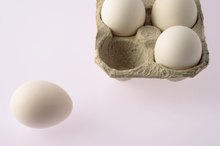What does fact checked mean?
At Healthfully, we strive to deliver objective content that is accurate and up-to-date. Our team periodically reviews articles in order to ensure content quality. The sources cited below consist of evidence from peer-reviewed journals, prominent medical organizations, academic associations, and government data.
The information contained on this site is for informational purposes only, and should not be used as a substitute for the advice of a professional health care provider. Please check with the appropriate physician regarding health questions and concerns. Although we strive to deliver accurate and up-to-date information, no guarantee to that effect is made.
How Much Protein Should a Female Bodybuilder Consume?
Protein is a critical component of the athlete's diet because of its direct effect on muscle growth. Physical activity causes the body to break down and use its protein stores. When you eat protein, the body breaks these nutrients down into amino acids, which it later uses to replace protein stores. Female bodybuilders place a heavy demand on their muscles and typically require about twice the protein as the average adult.
Per Day
The average adult needs about 0.4 grams of protein per pound of body weight each day. However, because of the increased demand bodybuilders place on muscle tissue, female bodybuilders need much more. For maximal gains in muscle mass, female bodybuilders should consume between 0.75 and 1 gram of protein per pound of body weight, according to "Essentials of Strength Training and Conditioning." For example, a 150 lb. female bodybuilder should consume about 113 to 150 grams of protein each day.
- The average adult needs about 0.4 grams of protein per pound of body weight each day.
- For maximal gains in muscle mass, female bodybuilders should consume between 0.75 and 1 gram of protein per pound of body weight, according to "Essentials of Strength Training and Conditioning."
After a Workout
How Much Protein Per Day if Working Out?
Learn More
The timing of your protein intake may also influence muscle gains, as the protein cell turnover rate, or the rate at which cells are depleted versus regenerated, is highest within about an hour after a workout. Research has demonstrated increased protein synthesis with doses of 6 to 40 grams of protein following a workout.
Type of Protein
Despite all the protein supplements on the market, there is no "magic bullet" for maximum muscular gains, according to a 2009 review published in the journal of the National Strength and Conditioning Association, or NSCA 23. Foods and supplements that contain milk protein are good choices because they contain an ideal mix of fast- and slow-digesting protein and an amino acid profile that meets the body's needs. Chocolate milk is ideal because it is cheap, convenient and also contains carbohydrates that help the body restore used-up glycogen stores.
- Despite all the protein supplements on the market, there is no "magic bullet" for maximum muscular gains, according to a 2009 review published in the journal of the National Strength and Conditioning Association, or NSCA 2.
- Chocolate milk is ideal because it is cheap, convenient and also contains carbohydrates that help the body restore used-up glycogen stores.
Additional Protein Tips
How Much Protein Do You Need When Lifting Weights?
Learn More
Protein from animal sources, such as milk, eggs and meat products, generally has more essential amino acids and are deemed "complete proteins." Incomplete proteins are those that lack one or more essential amino acid, and typically include plant sources such as beans. At least 65 percent of your total protein intake should come from complete sources, according to the NSCA. If you're a vegetarian, make sure to vary your protein sources to obtain all the essential amino acids you need.
- Protein from animal sources, such as milk, eggs and meat products, generally has more essential amino acids and are deemed "complete proteins."
Related Articles
References
- "Essentials of Strength Training and Conditioning"; Thomas R. Baechle and Roger R. Earle (Editors); 2008
- "Strength and Conditioning Journal"; The Post-Workout Protein Puzzle...; G. Damon Wells; February 2009
- "Strength and Conditioning Journal"; Protein Intake: The Effect of Timing; Jay Hoffman, Ph.D.; December 2007
- None
- None
- None
- None
- None
- None
- None
- None
- None
- None
- None
- None
- None
- None
- None
- None
- None
- None
- None
- None
- None
- None
- None
- None
- None
- None
- None
- None
- None
- None
Resources
Writer Bio
Graham Ulmer began writing professionally in 2006 and has been published in the "Military Medicine" journal. He is a certified strength-and-conditioning specialist with the National Strength and Conditioning Association. Ulmer holds a Master of Science in exercise science from the University of Idaho and a Bachelor of Science in psychology from Washington State University.









